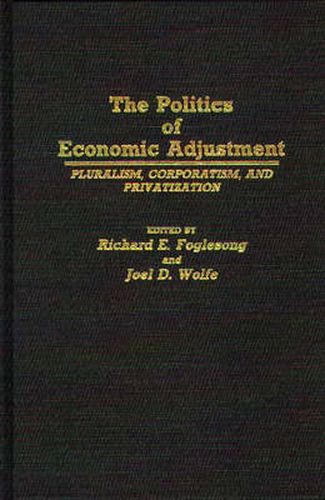Readings Newsletter
Become a Readings Member to make your shopping experience even easier.
Sign in or sign up for free!
You’re not far away from qualifying for FREE standard shipping within Australia
You’ve qualified for FREE standard shipping within Australia
The cart is loading…






Privatization and corporatism along with pluralist forms of adaptation have received attention as strategies for coping with the transformation of mature industrial economies. This book is an account of the determinants of a government’s choice between such strategies or of the relationships between these strategies and the Keynesian economic framework that predominated in the postwar era. This study considers both the determinants of the choice of an adjustment strategy, and how that choice affects the nature of liberal democracy. The essays collected here examine the divergent responses of liberal capitalist nations to the problem of economic adjustments, giving attention to the political factors affecting strategic choices aimed at bolstering employment, enhancing international competitiveness and restoring healthy productivity rates. The contributors examine the experiences of the United States, Britain, France, West Germany and Italy. They aim to explain how these advanced industrial nations have faced economic crisis differently and why they have responded as they have. In each case, the author focuses on whether and at what level the state pursued a corporatist approach involving a more direct government role in managing the economy with the assistance of private interest groups, a privatization strategy involving less state intervention and an increased reliance on market processes, or a form of pluralist adaptation. Throughout, the contributors aim to demonstrate that the strategy pursued can have a fundamental impact on the character of democracy and the patterns of policy making.
$9.00 standard shipping within Australia
FREE standard shipping within Australia for orders over $100.00
Express & International shipping calculated at checkout
Privatization and corporatism along with pluralist forms of adaptation have received attention as strategies for coping with the transformation of mature industrial economies. This book is an account of the determinants of a government’s choice between such strategies or of the relationships between these strategies and the Keynesian economic framework that predominated in the postwar era. This study considers both the determinants of the choice of an adjustment strategy, and how that choice affects the nature of liberal democracy. The essays collected here examine the divergent responses of liberal capitalist nations to the problem of economic adjustments, giving attention to the political factors affecting strategic choices aimed at bolstering employment, enhancing international competitiveness and restoring healthy productivity rates. The contributors examine the experiences of the United States, Britain, France, West Germany and Italy. They aim to explain how these advanced industrial nations have faced economic crisis differently and why they have responded as they have. In each case, the author focuses on whether and at what level the state pursued a corporatist approach involving a more direct government role in managing the economy with the assistance of private interest groups, a privatization strategy involving less state intervention and an increased reliance on market processes, or a form of pluralist adaptation. Throughout, the contributors aim to demonstrate that the strategy pursued can have a fundamental impact on the character of democracy and the patterns of policy making.